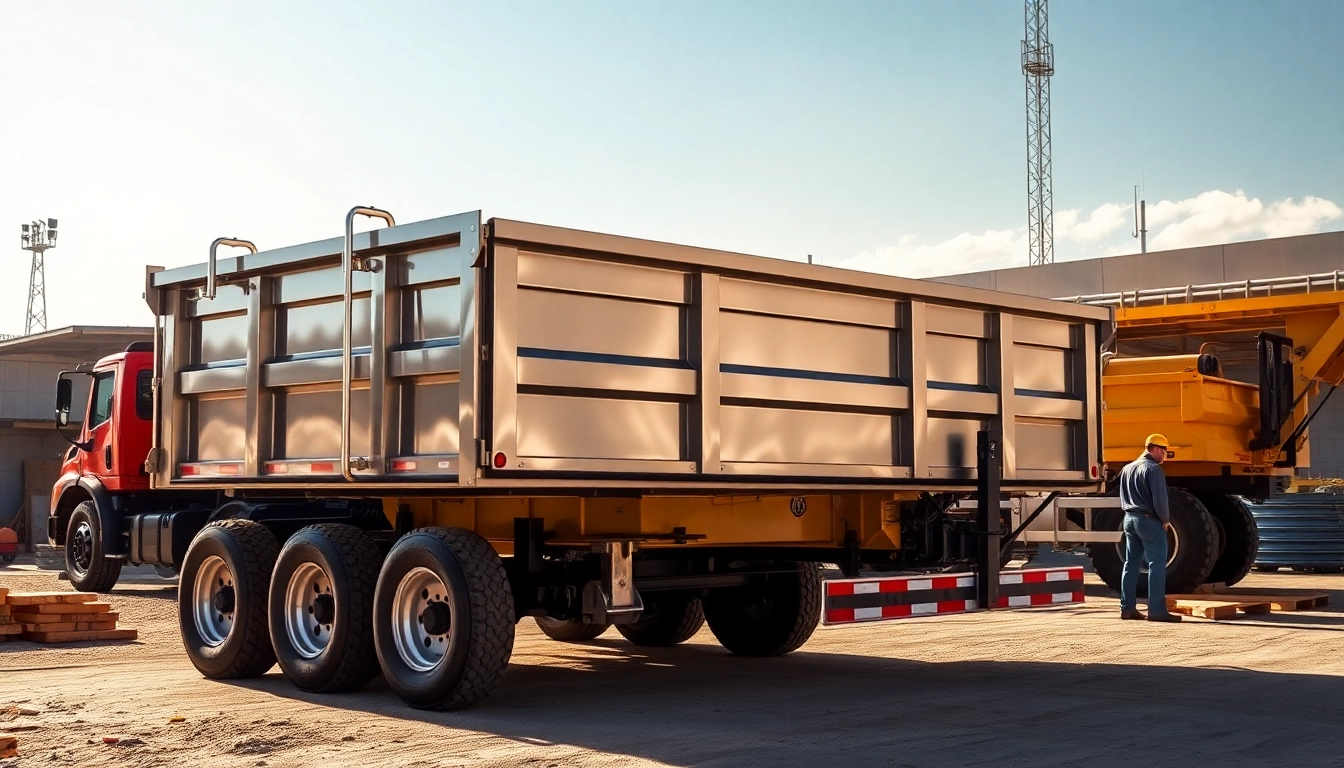Understanding Hydraulic Dump Trailers
Hydraulic dump trailers have become indispensable tools for both residential and commercial applications, especially in construction and landscaping. Their ability to lift and dump heavy loads with ease has made them a preferred choice for contractors, landscapers, and DIY enthusiasts. If you’re exploring hydraulic dump trailers for sale, it’s important to understand their mechanics and features to make a well-informed decision.
What is a Hydraulic Dump Trailer?
A hydraulic dump trailer is a specialized type of trailer equipped with a hydraulic lift system that allows the trailer bed to tilt and unload cargo. The hydraulic pump lifts the bed at an angle, facilitating a quick and efficient unloading process. This versatility makes hydraulic dump trailers ideal for transporting various payloads, including dirt, gravel, construction debris, and landscaping materials.
Key Components and Features
Hydraulic dump trailers come with a range of components that enhance their performance and usability. Key components include:
- Hydraulic System: The heart of the dump trailer, it consists of the pump, cylinder, and battery. The hydraulic system enables the bed to lift easily, often controlled by a remote or switch.
- Frame Construction: Most dump trailers are constructed from heavy-duty steel to withstand the rigors of hauling heavy loads. The frame is designed for durability and stability.
- Tongue Style: There are different styles of tongues, including A-frame and gooseneck. Each style provides varying towing capabilities and turning radii, which may influence your purchasing decision.
- Payload Capacity: This indicates how much weight the trailer can carry. It varies widely between models and is a critical factor in selecting the right unit for your needs.
- Bed Size and Design: Hydraulic dump trailers come in various dimensions, including single-axle and dual-axle designs. Bed sizes affect load capacity and suitability for different jobs.
Advantages of Using Hydraulic Dump Trailers
The use of hydraulic dump trailers offers numerous advantages:
- Efficiency: The hydraulic mechanism allows for fast loading and unloading, reducing downtime on job sites.
- Versatility: Capable of handling a wide variety of loads, from soil to construction debris and gravel.
- Ease of Use: The hydraulic lifts require minimal physical effort to operate, making them user-friendly for operators of all skill levels.
- Wide Range of Sizes: Available in multiple sizes, hydraulic dump trailers can cater to personal use as well as industrial and commercial applications.
Types of Hydraulic Dump Trailers for Sale
When shopping for a hydraulic dump trailer, it’s essential to understand the various types available. Each type serves different needs and operational contexts.
Standard Hydraulic Dump Trailers
Standard hydraulic dump trailers are the most common type found on the market. They come in various sizes and capacities and are suitable for general hauling tasks. Generally equipped with a robust hydraulic system and sturdy construction, they are ideal for homeowners and contractors alike.
Gooseneck Hydraulic Dump Trailers
Designed for larger hauling operations, gooseneck hydraulic dump trailers feature a hitch that attaches to the bed of a truck. This design allows for greater load capacities and improved stability while in transit. They are especially popular among those who frequently haul heavy materials over long distances.
Specialty Hydraulic Dump Trailers
Specialty hydraulic dump trailers are customized for unique applications, such as dump trailers designed specifically for commercial landscaping or equipment transport. These trailers may offer special features like enhanced suspension systems, specialized load configurations, or additional storage options for tools and supplies.
Factors to Consider When Buying
Choosing the right hydraulic dump trailer requires careful consideration of various factors to ensure it meets your specific needs.
Load Capacity and Size Requirements
Understanding the load capacity is critical when selecting a dump trailer. Consider what types of materials you will be hauling and the weight each load typically holds. Ensure the payload capacity of the dump trailer exceeds your maximum load requirement. Size also matters; larger trailers can accommodate bulkier loads but may be challenging to maneuver in tight spaces.
Material Quality and Durability
Investigate the materials used in construction. Durable steel frames are preferable, especially if you plan to haul heavy or abrasive materials. Check for corrosion-resistant coatings that enhance longevity and performance.
Hydraulic System Specifications
The efficiency of a hydraulic dump trailer depends significantly on its hydraulic system. Analyze specifications such as pump power, cylinder size, and lift speed. A powerful hydraulic pump can affect unloading time and overall performance, particularly for heavy loads.
Maintaining Your Hydraulic Dump Trailer
Proper maintenance is essential to keep your hydraulic dump trailer functioning optimally over its lifespan. Preventive care can help to identify minor issues before they become significant problems.
Routine Maintenance Practices
Regular maintenance routines should include:
- Hydraulic Fluid Checks: Inspect hydraulic fluid levels regularly and change the fluid as needed to optimize system performance.
- Inspecting the Hydraulic Lines: Look for cracks or leaks in the hydraulic hoses and lines to prevent unexpected failures.
- Cleaning: Regularly clean the trailer bed, frame, and undercarriage to remove dirt and debris that can lead to corrosion.
- Tire Maintenance: Check tires for proper inflation and wear regularly as they play a crucial role in safe transport.
Common Issues and Repairs
Hydraulic dump trailers may experience common issues such as hydraulic leaks, unwanted squeaking sounds from moving parts, or lift failures. Addressing these concerns often involves:
- Tightening loose fittings and connections.
- Replacing worn-out hydraulic seals.
- Inspecting and, if needed, replacing hydraulic pumps or cylinders.
Best Practices for Longevity
To maximize the lifespan of your hydraulic dump trailer, follow these best practices:
- Limit overloads as exceeding the manufacturer’s specified weight can cause frame and hydraulic system damage.
- Store the trailer properly, protecting it from the elements, particularly during extreme weather conditions.
- Regularly review and adhere to the manufacturer’s maintenance recommendations.
Where to Find Hydraulic Dump Trailers for Sale
The market for hydraulic dump trailers is diverse, offering numerous purchasing avenues. Here are some reputable sources:
Reputable Dealers and Manufacturers
Buying from established dealers ensures that you will receive quality products backed by warranties and customer support. Look for dealers who specialize in trailers and have a reputation for selling high-quality equipment. Some popular brands to consider include:
- Big Tex Trailers: Known for their robust construction and reliability.
- Sure-Trac: Offers a wide selection of hydraulic trailers for various applications.
- Diamond C Trailers: Recognized for their innovative designs and durability.
Online Marketplaces and Auctions
Websites like eBay, Craigslist, and specific trailer-selling sites provide platforms to purchase hydraulic dump trailers, often at competitive prices. Make sure you vet sellers by checking reviews and ensuring they have a proven track record of positive transactions.
Tips for Negotiating the Best Price
When you’re ready to purchase, remember these negotiation tips:
- Research competitors’ prices to have a clear understanding of the market value.
- Be prepared to walk away. This can sometimes lead to better offers from sellers eager to make a sale.
- Ask about financing options. Some dealers offer installment plans, which can be beneficial in negotiations.

